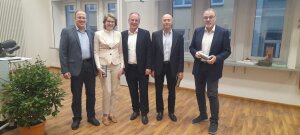Research Symposium in Honor of Professor Uwe Cantner
Published:
Uwe Cantner with the laudator and Keynote speakers
Image: Susanne BüchnerOn September 26, 2025, former and current colleagues, doctoral students, and long-standing academic companions gathered to honor Professor Uwe Cantner with a Research Symposium. The event, organized by the Chair of Microeconomics and Dean’s office, traced the key stages of Professor Cantner’s distinguished academic career and celebrated his lasting contributions to the field of economics.
The Dean of the Faculty of Economics and Business Administration, Professor Peter Walgenbach, opened the Symposium by underlining Professor Cantner’s profound influence on the faculty and its development. This was followed by a laudatory address by Professor Jens Krüger (TU Darmstadt), , Professor Cantner’s first habilitand and long-time collaborator. His speech not only highlighted Professor Cantner’s academic achievements and many leadership roles, but was also enriched with personal anecdotes that illustrated their close professional and personal connection.
The academic program featured three keynote lectures delivered by internationally renowned scholars and long-time collaborators:
- Professor Franco Malerba (Bocconi University, Milan), Professor Cantner’s predecessor as President of the International Joseph A. Schumpeter Society, spoke on “Schumpeter, Evolutionary Economics, and Industrial Dynamics.”
- Professor Mette Praest Knudsen (University of Southern Denmark, Odense), where Professor Cantner has served as Professor of Economics for 15 years, presented on “The Emergence of Ecosystems: Partnerships, Technologies, and Politics.”
- Professor Dietmar Harhoff (Max Planck Institute for Innovation and Competition, Munich), Professor Cantner’s predecessor as Chairman of the Expert Commission for Research and Innovation, concluded with a lecture on “The Science of Science (Funding).”
The Symposium provided a fitting tribute to Professor Cantner’s remarkable academic journey, his leadership, and his enduring influence on research, teaching, and policy advice in economics.
